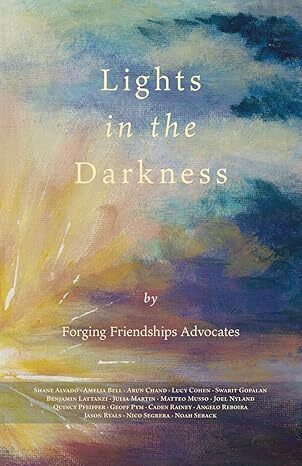Lights in the Darkness

I recently spent an unforgettable afternoon at a book reading for Lights in the Darkness, a book of essays from sixteen nonspeaking authors. Listening to the words from the minds of these young people who could finally be heard after years of not being able to communicate moved me to tears and opened a whole new world of understanding for me.
The essays give a view into the thoughts of these nonspeakers who have become “spellers” to communicate. The authors are creative, intelligent, and profoundly compassionate. And their stories brought me to a greater understanding of close family members who are neurodivergent and struggle to communicate.
It is a universal need to be seen and to be heard. True communication requires listening, watching, and understanding. If someone doesn’t communicate with the standards within our society, often we make assumptions about intelligence and abilities instead of recognizing that some brains work differently from the standards of the average neurotypical person. The neurodivergent person’s brain simply works another way.
Close your eyes and imagine what it would be like to be the one who is ignored and shoved aside because someone else has decided who you are. Or imagine how you felt when it happened in your life. It feels pretty lousy.
For anyone whose brain functions at different levels from what is considered the standard, the ability to communicate thoughts and emotions so others understand them is probably the hardest challenge. And it is only amplified a thousand times more for those who are nonspeakers.
Until recently, nonspeakers were discarded and ignored, except by those closest to them who knew the truth. The thoughts within those brains were universal, but those same brains don’t allow the words to come from their mouths. Those same brains sometimes cause their bodies to do things out of their control, so it makes them seem something other than what they were—just regular folks who feel pain, frustration, joy, and love.
Do not listen to those who “think” they know something about neurodivergent individuals but don’t know the individuals or follow the science. Those on the spectrum face challenges that I don’t, but it doesn’t make them less than anyone. They write poems, they pay taxes, and they are potty trained—all things one man who should know better has said they can’t do. He is the one who is less than when he diminishes other human beings.
And read Lights in the Darkness to really understand that human emotions are universal even if we have different ways of expressing them.
LIGHTS IN THE DARKNESS ON AMAZON


